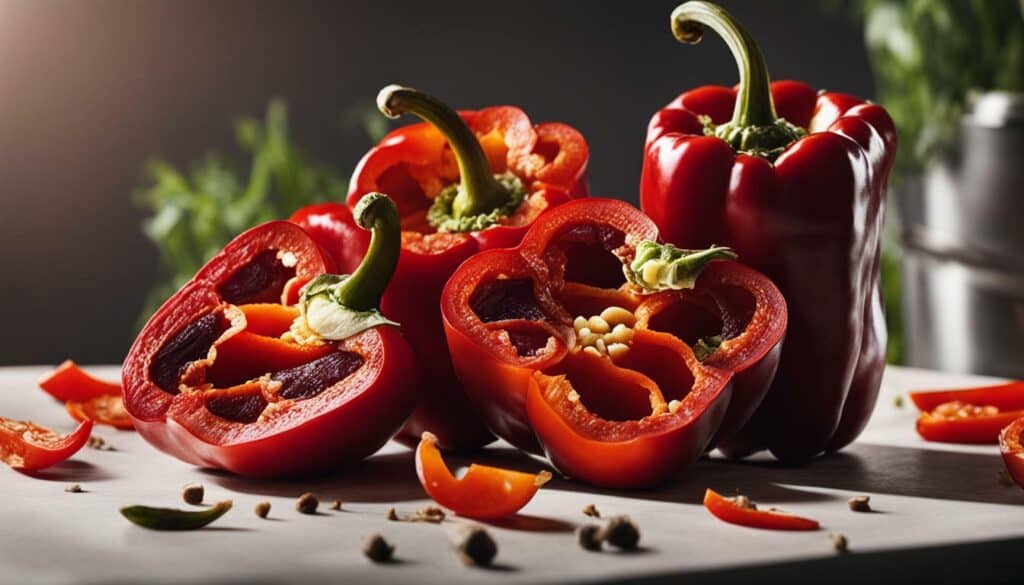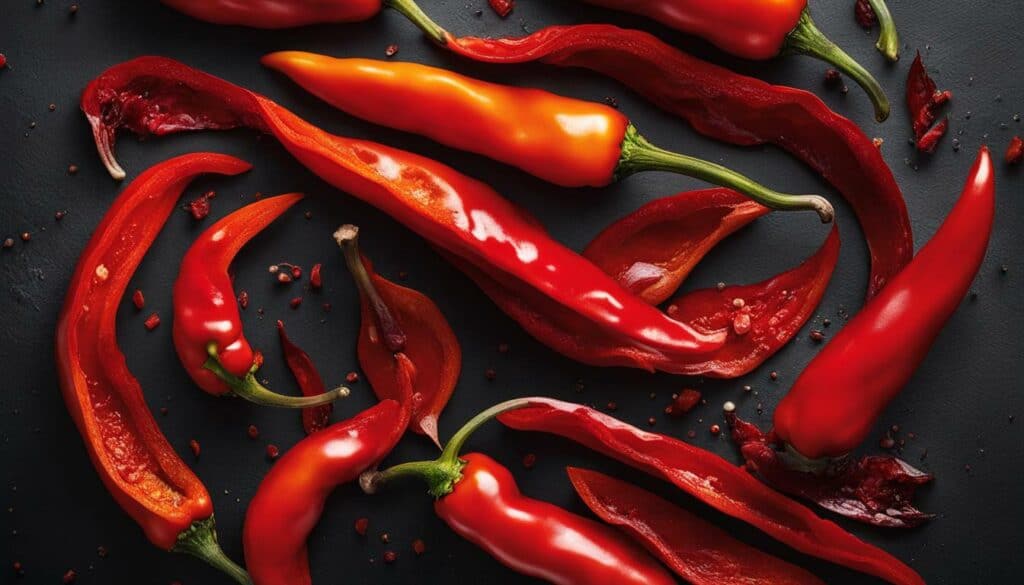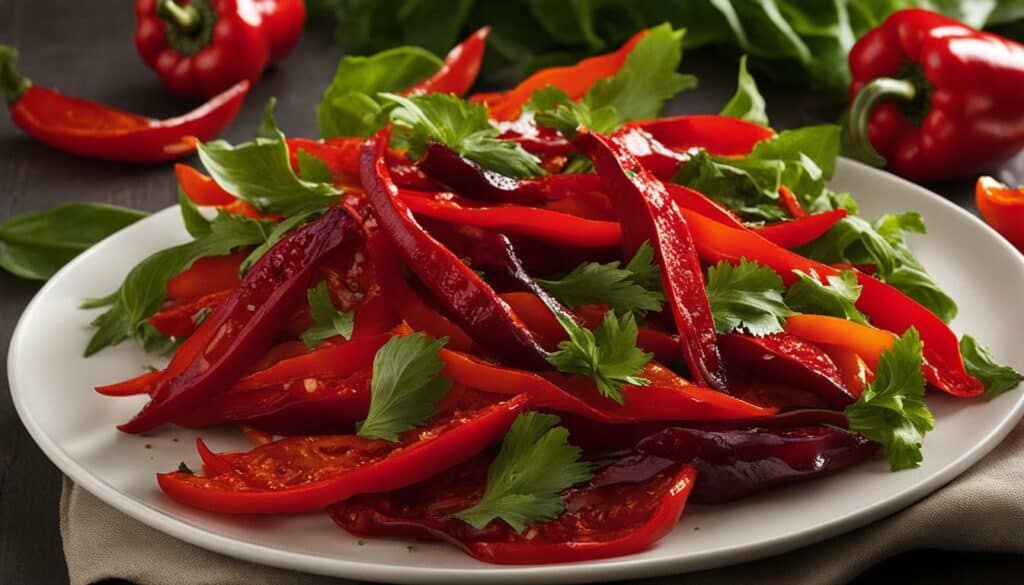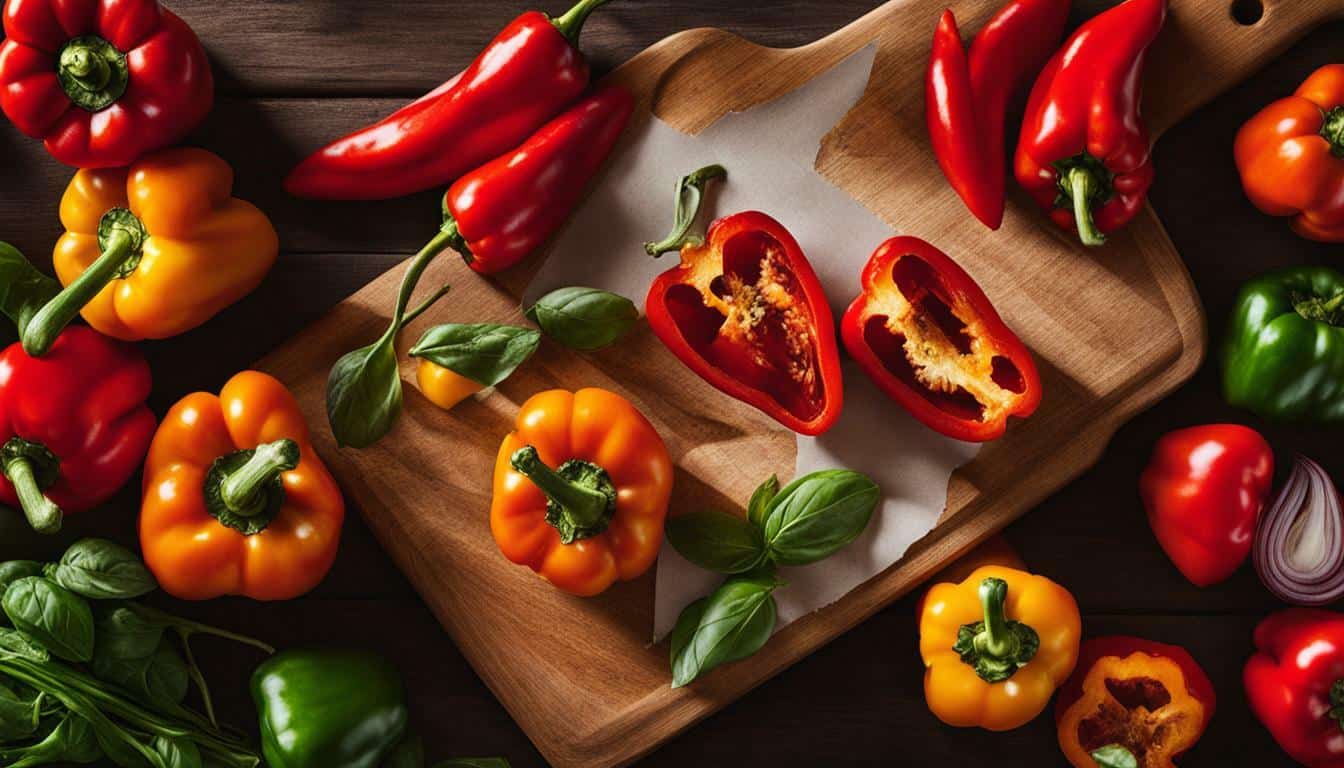Roasted red peppers are not only flavorful but also packed with essential nutrients that can enhance your overall health. These vibrant peppers are a low-calorie option, with just 25 calories per serving of 1.5 peppers. They are also heart-healthy, as they contain low amounts of fat and cholesterol. But the nutritional benefits don’t stop there. Roasted red peppers are a great source of carbohydrates and fiber, providing sustained energy and promoting healthy digestion.
They are also rich in vitamin C, with just half a cup of roasted red peppers providing nearly all of your recommended daily amount. What’s more, roasting the peppers actually increases the concentration of vitamin C compared to raw peppers. Additionally, they contain provitamin A carotenoids, which are converted into vitamin A in the body. With their nutritious profile and delicious taste, roasted red peppers are a fantastic addition to any diet.
- Roasted red peppers are low in calories, making them a great choice for weight management.
- They are heart-healthy, with low fat and cholesterol content.
- Roasted red peppers are a good source of carbohydrates and fiber for sustained energy and healthy digestion.
- They are packed with vitamin C, with just half a cup providing nearly all of your recommended daily amount.
- Roasting red peppers actually increases the concentration of vitamin C compared to raw peppers.
The Low-Calorie Profile of Roasted Red Peppers
If you’re watching your calorie intake, you’ll be pleased to know that roasted red peppers are incredibly low in calories. With just 25 calories per serving of 1.5 peppers, they make a guilt-free addition to any meal. Not only are they delicious, but they also offer numerous health benefits.
Roasted red peppers are a great choice for weight management as they provide a satisfyingly sweet and smoky flavor without adding excess calories. They can be enjoyed as a snack, added to salads, sandwiches, or even incorporated into various recipes to enhance the taste and texture of your dishes.
Furthermore, roasted red peppers are low in fat and cholesterol, making them a heart-healthy option. They are rich in nutrients, including carbohydrates and fiber, which provide sustained energy and support healthy digestion. Their vibrant color is a sign of their high vitamin C content, a powerful antioxidant that boosts the immune system and promotes overall well-being.
| Nutrition Facts | Amount per Serving (1.5 peppers) |
|---|---|
| Calories | 25 |
| Total Fat | 0g |
| Cholesterol | 0mg |
| Carbohydrates | 6g |
| Fiber | 2g |
| Vitamin C | 80% of Daily Value |
Roasting red peppers enhances their natural flavors and concentrates their nutritional content. It also breaks down the cell walls, making the nutrients more accessible to our bodies. So, whether you’re looking to maintain a healthy weight or improve your cardiovascular health, roasted red peppers can be a valuable addition to your diet.
Next, we’ll explore the specific heart-healthy benefits of consuming roasted red peppers and how they can contribute to your overall well-being.
Heart-Healthy Benefits of Roasted Red Peppers
Taking care of your heart health becomes easier with the inclusion of roasted red peppers in your meals. These vibrant and delicious peppers offer numerous benefits that contribute to a healthy heart and overall well-being.
Roasted red peppers are low in fat and cholesterol, making them an excellent addition to a heart-healthy diet. They are also packed with essential nutrients that support cardiovascular health. Just half a cup of roasted red peppers provides nearly all of your recommended daily amount of vitamin C, a powerful antioxidant that helps protect the heart from damage caused by free radicals.

In addition to vitamin C, roasted red peppers are a good source of provitamin A carotenoids, which are converted into vitamin A in the body. Vitamin A promotes a healthy heart by supporting proper blood flow and reducing inflammation. Including roasted red peppers in your meals can help maintain healthy cholesterol levels and reduce the risk of heart disease.
Furthermore, roasted red peppers are low in calories, with just 25 calories per serving of 1.5 peppers. This makes them an ideal choice for those watching their weight or trying to manage their calorie intake. They are also rich in carbohydrates and fiber, providing sustained energy and promoting healthy digestion.
Incorporating roasted red peppers into your diet is simple and versatile. You can enjoy them as a side dish, add them to salads, sandwiches, or wraps, or use them as a flavorful ingredient in various recipes. Their sweet and smoky flavor adds depth to any dish, making it a delightful addition to your culinary repertoire.
Heart-Healthy Benefits Recap:
- Low in fat and cholesterol
- High in vitamin C and provitamin A carotenoids
- Supports cardiovascular health
- Helps maintain healthy cholesterol levels
- Low in calories, rich in carbohydrates and fiber
As you can see, roasted red peppers offer a range of heart-healthy benefits while adding vibrant flavors to your meals. So why not incorporate these nutritious peppers into your diet and enjoy the delicious taste while nourishing your heart?
Nutrient Powerhouse: Carbohydrates and Fiber in Roasted Red Peppers
Don’t underestimate the nutrient-packed nature of roasted red peppers, as they boast a notable amount of carbohydrates and fiber. These vibrant peppers are not only delicious but also provide essential nutrients that support a healthy diet.
When it comes to carbohydrates, roasted red peppers offer a moderate amount, making them a great choice for energy. Just half a cup of roasted red peppers contains approximately 6 grams of carbohydrates. Whether you’re looking for a quick energy boost before a workout or need sustained energy throughout the day, roasted red peppers can be a valuable addition to your meals.
Furthermore, roasted red peppers are an excellent source of dietary fiber. Fiber plays a crucial role in maintaining a healthy digestive system and promoting overall well-being. Half a cup of roasted red peppers provides about 2 grams of fiber, aiding in digestion and keeping you feeling satisfied for longer.
| Nutrient | Amount per serving (1/2 cup) |
|---|---|
| Carbohydrates | 6 grams |
| Fiber | 2 grams |
So, whether you’re seeking an energy boost or looking to improve your digestive health, roasted red peppers are an excellent choice. Try incorporating them into your salads, sandwiches, or even as a flavorful side dish. Their vibrant color and rich nutrient profile make them a valuable addition to any diet.

Rich in vitamin C, roasted red peppers can boost your immune system and support overall wellness. Vitamin C, also known as ascorbic acid, is a powerful antioxidant that helps protect the body against harmful free radicals. It plays a vital role in collagen synthesis, which is essential for healthy skin, bones, and connective tissues. Moreover, vitamin C enhances iron absorption, supports brain function, and promotes cardiovascular health.
When it comes to getting your daily dose of vitamin C, roasted red peppers are an excellent choice. An average serving of half a cup of roasted red peppers provides a whopping 117 milligrams of vitamin C, which is more than the recommended daily intake for most adults. This makes roasted red peppers one of the richest sources of this essential nutrient.
To top it off, roasting red peppers actually increases the concentration of vitamin C compared to raw peppers. The high heat applied during the roasting process breaks down the plant’s cellular structure, making the vitamin C more accessible and easier for the body to absorb. So by enjoying roasted red peppers, you can maximize the benefits of this superstar nutrient.
| Nutrient | Amount per Serving (1/2 cup) | % Daily Value* |
|---|---|---|
| Vitamin C | 117 mg | 195% |
| Vitamin A | 189 µg | 21% |
| Carbohydrates | 5 g | 2% |
| Fiber | 2 g | 8% |
In addition to vitamin C, roasted red peppers also contain provitamin A carotenoids, such as beta-carotene. These compounds are converted into vitamin A in the body and are essential for healthy vision, immune function, and cell growth. So by incorporating roasted red peppers into your diet, you can reap the benefits of multiple vitamins and minerals.
Whether you enjoy them in salads, sandwiches, or as a flavorful addition to your favorite recipes, roasted red peppers are a tasty and nutritious way to boost your vitamin C intake and enhance your overall well-being.

Roasted red peppers offer a substantial amount of antioxidants, protecting your cells from oxidative stress. These antioxidants play a crucial role in neutralizing harmful free radicals, which can cause damage to your body’s cells and contribute to various diseases. By incorporating roasted red peppers into your diet, you can reap the benefits of these powerful compounds and support your overall health.
One of the key antioxidants found in roasted red peppers is vitamin C. As mentioned earlier, roasting actually increases the concentration of vitamin C compared to raw peppers. Vitamin C is known for its immune-boosting properties and its ability to promote collagen synthesis, which is essential for healthy skin and wound healing. Additionally, vitamin C acts as a powerful antioxidant, protecting your cells from damage caused by free radicals.
Roasted red peppers also contain other antioxidants, such as provitamin A carotenoids. These carotenoids, including beta-carotene, need to be converted into vitamin A in the body. Vitamin A is important for maintaining healthy vision, supporting immune function, and promoting proper cell growth and development.
With their vibrant color and rich flavor, roasted red peppers not only add a burst of taste to your dishes but also provide a nutritional boost. Incorporating these antioxidant-packed peppers into your diet can help support your overall well-being and protect your cells from oxidative stress.
Table: Antioxidant Content in Roasted Red Peppers
| Antioxidant | Amount per 100g |
|---|---|
| Vitamin C | 127.7mg |
| Provitamin A Carotenoids | 2,000-5,000 IU |
| Other Antioxidants | Varied |
As you can see from the table above, roasted red peppers are a rich source of antioxidants, particularly vitamin C and provitamin A carotenoids. Including these peppers in your meals can help protect your cells and support your overall health.

To reap the most benefits from roasted red peppers, try incorporating them into salads, sandwiches, stir-fries, and pasta dishes. Their smoky and slightly sweet flavor adds depth to any recipe. You can also enjoy them as a topping for pizzas, in dips, or stuffed with your favorite fillings. Get creative in the kitchen and discover the many ways you can savor the antioxidant power of roasted red peppers.
A Versatile Ingredient: Roasted Red Pepper Recipes
Let your culinary creativity soar with these mouthwatering roasted red pepper recipes and dishes. Roasted red peppers add a delightful smoky and sweet flavor to any meal, making them a versatile ingredient that can elevate the taste of numerous dishes. Whether you’re a seasoned chef or a beginner in the kitchen, these recipes are sure to impress your taste buds and leave you craving for more.
Roasted Red Pepper Hummus

If you’re a fan of hummus, you’ll love this twist on the classic recipe. Simply combine roasted red peppers with chickpeas, tahini, garlic, lemon juice, and olive oil in a food processor. Blend until smooth and creamy, then season with salt and pepper to taste. Serve with pita bread or fresh vegetables for a healthy and satisfying snack.
Roasted Red Pepper Pasta
Elevate your pasta game with this flavorful roasted red pepper sauce. Start by sautéing onions and garlic in olive oil until fragrant. Then, add roasted red peppers, vegetable broth, and a touch of cream. Simmer the sauce until it thickens, then blend until smooth using an immersion blender or regular blender. Toss the sauce with your favorite cooked pasta and garnish with fresh basil and grated Parmesan cheese.
Grilled Chicken and Roasted Red Pepper Sandwich
For a delicious and filling lunch, try this grilled chicken and roasted red pepper sandwich. Marinate boneless, skinless chicken breasts in a mixture of olive oil, lemon juice, garlic, and Italian seasoning. Grill the chicken until cooked through and juicy. Meanwhile, spread mayonnaise on slices of crusty bread and layer with roasted red peppers, grilled chicken, lettuce, and sliced tomatoes. Enjoy this hearty sandwich with a side of mixed greens or sweet potato fries.
With these tantalizing roasted red pepper recipes, your taste buds are in for a treat. Whether you’re looking for a healthy snack, a comforting pasta dish, or a satisfying sandwich, roasted red peppers are the star ingredient that will take your meals to the next level. So, let your culinary creativity soar and indulge in the deliciousness of these versatile peppers.
How to Roast Red Peppers: A Step-by-Step Guide
Discover the simple yet rewarding process of roasting red peppers in the comfort of your own kitchen. Roasted red peppers not only add a burst of flavor to your dishes but also offer a range of nutritional benefits. From their low-calorie profile to their abundance of vitamins and antioxidants, roasted red peppers are a versatile ingredient that can elevate your culinary creations.
Here is a step-by-step guide to help you roast red peppers:
- Preheat your oven to 450°F (232°C).
- Wash the red peppers thoroughly and pat them dry.
- Place the peppers on a baking sheet lined with parchment paper.
- Drizzle the peppers with olive oil, making sure to coat them evenly.
- Sprinkle salt and freshly ground black pepper over the peppers to taste.
- Roast the peppers in the preheated oven for 25-30 minutes, until the skin is blistered and charred.
- Remove the peppers from the oven and immediately transfer them to a bowl.
- Cover the bowl tightly with plastic wrap and let the peppers steam for about 10 minutes. This will make it easier to remove the skin.
- After steaming, carefully peel off the skin from the peppers. The skin should come off easily.
- Once peeled, slice the peppers open and remove the seeds and membranes.
- Your roasted red peppers are now ready to be used in your favorite recipes or enjoyed on their own!
Roasted Red Peppers: A Flavorful Addition to Your Culinary Repertoire
Roasted red peppers can be used in a wide variety of dishes to enhance their taste and visual appeal. They can be chopped and added to salads, sandwiches, or pasta dishes, or blended into creamy dips and spreads. The smoky sweetness of roasted red peppers elevates the flavors of soups, stews, and sauces, while their vibrant color adds an appetizing touch to any meal.
So why not experiment with roasted red peppers in your kitchen? Whether you’re a cooking enthusiast or a beginner, this simple and gratifying roasting process will open up a world of culinary possibilities. Start by following this step-by-step guide, and soon you’ll be savoring the rich flavor and nutritional benefits of roasted red peppers in your favorite dishes.
| Nutrient | Amount per Serving (1.5 peppers) |
|---|---|
| Calories | 25 |
| Fat | 0g |
| Cholesterol | 0mg |
| Carbohydrates | 5g |
| Fiber | 2g |
| Vitamin C | 117% of daily recommended intake |
Roasted red peppers are not only delicious but also packed with essential nutrients. With just 25 calories per serving, they are a great choice for those watching their calorie intake. They are low in fat and cholesterol, making them a heart-healthy option. Additionally, roasted red peppers provide a significant amount of vitamin C, contributing to your daily recommended intake. The roasting process actually increases the concentration of vitamin C compared to raw peppers, making them an excellent source of this vital nutrient.

Incorporating roasted red peppers into your diet adds a burst of flavor and a host of nutritional benefits. So why not give it a try? Roasting red peppers is a simple and rewarding process that can elevate your dishes to new heights. Follow this step-by-step guide, experiment with recipes, and enjoy the delicious goodness of roasted red peppers in your meals!
Incorporating Roasted Red Peppers into Your Diet
Elevate your meals with the addition of roasted red peppers and enhance your nutrition effortlessly. These flavorful peppers not only add a delicious twist to your dishes but also offer numerous health benefits. Whether you roast them at home or use store-bought options, incorporating roasted red peppers into your diet is a simple way to boost your overall wellness.
Roasted red peppers are low in calories, making them an ideal choice for those watching their weight. With just 25 calories per serving of 1.5 peppers, you can enjoy their vibrant flavor without worrying about excess calorie intake. They are also heart-healthy, as they are low in fat and cholesterol. By including roasted red peppers in your meals, you can support heart health and maintain a balanced diet.
One of the standout nutritional benefits of roasted red peppers is their high content of vitamin C. Just half a cup of roasted red peppers provides nearly all of your recommended daily amount of vitamin C. Vitamin C is essential for immune function, collagen production, and antioxidant protection. Interestingly, roasting the peppers actually increases the concentration of vitamin C compared to raw peppers, making them an excellent source of this vital nutrient.

Additionally, roasted red peppers contain provitamin A carotenoids, which are converted into vitamin A in the body. Vitamin A is crucial for vision health, gene expression, and immune function. By incorporating roasted red peppers into your diet, you can ensure you are getting a good dose of this important nutrient.
There are countless ways to include roasted red peppers in your meals. They can be added to sandwiches, salads, pasta dishes, omelets, and more. Their sweet and smoky flavor pairs well with a variety of ingredients, enhancing the overall taste of your meals. Not only do roasted red peppers add a pop of color to your dishes, but they also provide a nutritional boost, making them a versatile and nutritious ingredient to incorporate into your everyday cooking.
Try this delicious Roasted Red Pepper Recipe:
- Cut roasted red peppers into thin strips.
- Toss the strips with olive oil, minced garlic, and a pinch of salt and black pepper.
- Spread the mixture onto a baking sheet and roast in the oven at 400°F (200°C) for 15-20 minutes, or until the peppers are slightly charred.
- Remove from the oven and let cool.
- Use the roasted red peppers as a topping for pizzas, in wraps, or as a flavorful addition to your favorite dishes.
With their nutritional value and versatility, roasted red peppers are a great addition to any diet. Experiment with different recipes and enjoy the delicious flavors and health benefits they bring to your meals.
Conclusion
With their low calorie count, abundance of nutrients, and enticing flavor, roasted red peppers are a winning choice for your overall health and culinary adventures. These vibrant and delicious peppers pack a nutritional punch, making them an excellent addition to any diet.
When it comes to calories, roasted red peppers are a standout. With just 25 calories per serving of 1.5 peppers, they are a guilt-free option that can be enjoyed in generous portions. Whether you’re watching your weight or simply looking to maintain a healthy lifestyle, roasted red peppers are a satisfying and low-calorie choice.
Not only are they low in calories, but roasted red peppers are also heart-healthy. They contain minimal amounts of fat and cholesterol, making them a great option for those looking to support cardiovascular health. By incorporating roasted red peppers into your meals, you can enjoy their delicious flavor while taking care of your heart.
The nutritional benefits of roasted red peppers extend beyond their low-calorie and heart-healthy profile. They are a rich source of carbohydrates and fiber, providing sustained energy and promoting healthy digestion. Additionally, roasted red peppers are packed with vitamin C. Just half a cup of roasted red peppers provides nearly all of your recommended daily amount of vitamin C. The process of roasting actually increases the concentration of vitamin C compared to raw peppers, ensuring that you can reap the maximum benefits.
Incorporating roasted red peppers into your diet is not only beneficial for your health but also adds a burst of flavor to your meals. Whether you use them in salads, sandwiches, pasta dishes, or as a topping for pizzas, their versatility knows no bounds. Get creative in the kitchen and explore the myriad of delicious recipes and dishes that showcase the deliciousness of roasted red peppers.
In conclusion, roasted red peppers are a nutritious and flavorful addition to any diet. From their low calorie count to their rich nutrient profile, these peppers offer a range of health benefits. So why not spice up your meals and embark on a culinary adventure with the delightful flavor and versatility of roasted red peppers?
FAQ
Q: What is the nutritional information of roasted red peppers?
A: Roasted red peppers are low in calories, with just 25 calories per serving of 1.5 peppers. They are also low in fat and cholesterol. Roasted red peppers are a good source of carbohydrates, fiber, and vitamin C. They also contain provitamin A carotenoids.
Q: Are roasted red peppers low in calories?
A: Yes, roasted red peppers have a low-calorie profile, with just 25 calories per serving of 1.5 peppers. They are a great addition to your diet for weight management purposes.
Q: What are the heart-healthy benefits of roasted red peppers?
A: Roasted red peppers are low in fat and cholesterol, making them beneficial for heart health. Including them in your diet can contribute to a heart-healthy lifestyle.
Q: What nutrients do roasted red peppers provide?
A: Roasted red peppers are a good source of carbohydrates, fiber, and vitamin C. They also contain provitamin A carotenoids, which can be converted into vitamin A in the body.
Q: How much vitamin C do roasted red peppers contain?
A: Just half a cup of roasted red peppers provides nearly all of your recommended daily amount of vitamin C. Roasting the peppers actually increases the concentration of vitamin C compared to raw peppers.
Q: Do roasted red peppers have antioxidant properties?
A: Yes, roasted red peppers have antioxidant properties, which help combat harmful free radicals in the body.
Q: How can I incorporate roasted red peppers into my diet?
A: You can enjoy roasted red peppers in a variety of ways, such as adding them to salads, sandwiches, pasta dishes, or as a topping for pizzas. They can also be blended into sauces or dips for added flavor and nutrition.
Q: How do I roast red peppers at home?
A: To roast red peppers at home, you can place them on a baking sheet and broil them in the oven until the skin is charred. Then, seal them in a plastic bag to steam, which makes it easier to remove the skin. After peeling, they are ready to be used in your favorite recipes.
Q: What are some recipes that use roasted red peppers?
A: Roasted red peppers can be used in various recipes, such as roasted red pepper hummus, roasted red pepper pasta, roasted red pepper soup, or even stuffed roasted red peppers. The possibilities are endless!
Q: Are roasted red peppers a nutritious addition to a diet?
A: Yes, roasted red peppers are a nutritious and flavorful addition to your diet. They are low in calories, heart-healthy, and provide essential nutrients like vitamin C and fiber.
What Nutritional Benefits Do Roasted Red Peppers Add to Meals?
Roasted red peppers not only add a burst of flavor but also offer various nutritional benefits to spice up your meals. They are packed with vitamin C, supporting immune health, and vitamin A, promoting good vision. These peppers are also a great source of fiber and contain antioxidants, which may help reduce inflammation in the body. Adding roasted red peppers to your meals can contribute to a well-balanced diet while enhancing the taste.





Leave a Reply